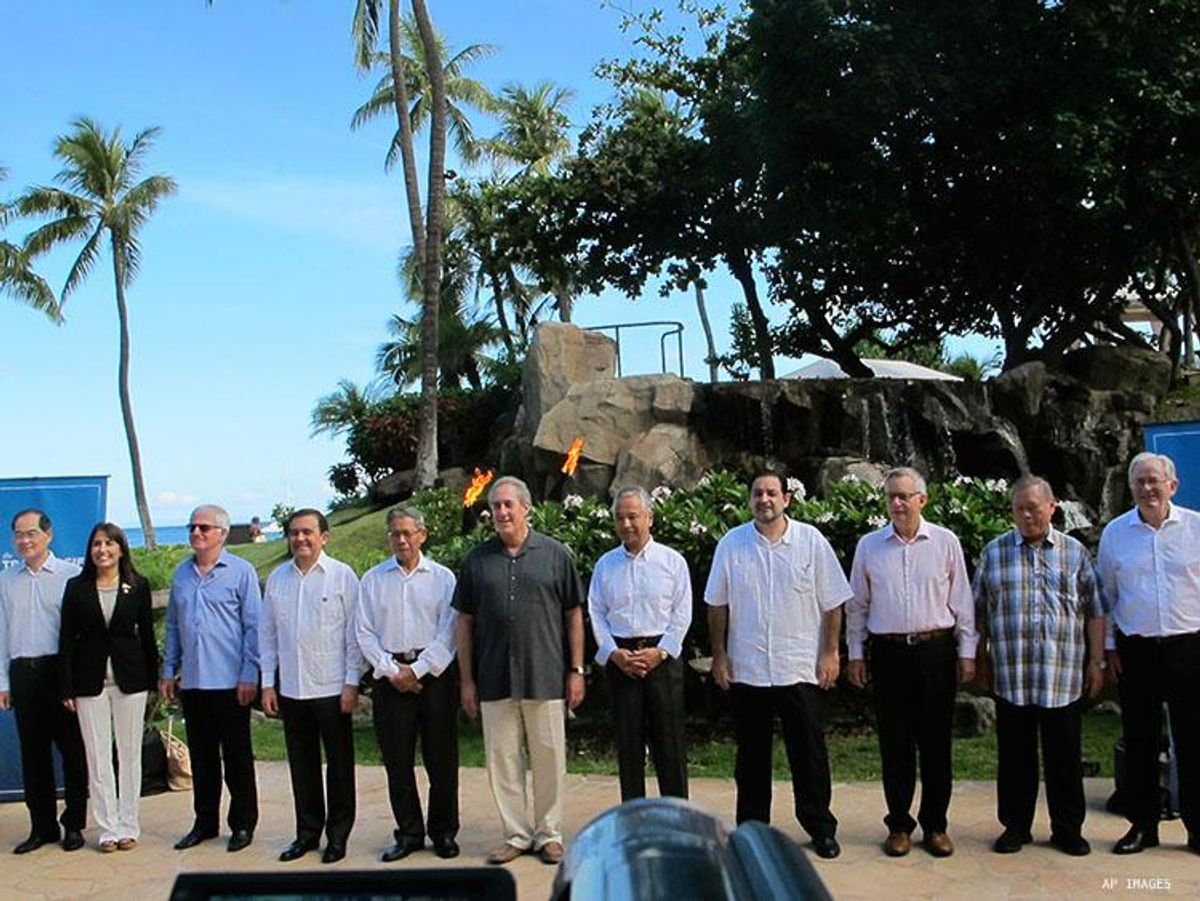The deal is done, but now President Obama must sell Congress on a historic trade agreement reached today by the United States and 11 other Pacific Rim nations. The Trans-Pacific Partnership would unite 40 percent of the world's economy, from Canada and Chile to Japan and Australia.
The accord is the result of nearly eight years of negotiations, including five days of round-the-clock sessions in Atlanta, reportedThe New York Times.
President Obama invested personal time in pressing world leaders to seal the deal, arguing it would build a barrier to contain China's economic influence, and shift control of Pacific commerce away from Beijing.
Opponents of the agreement include labor unions, environmental groups and liberal Democrats, who have vowed to block the accord from passage by Congress, notes The Washington Post. Critics say the TPP protects the interests of large multinational corporations but does far too little to protect worker's rights and the environment.
In June, The Advocate's sibling publication Plus magazine reported that the TPP had "horrified" the humanitarian group Doctors Without Borders, would dramatically reduce global access to drugs used to treat HIV, and would embrace nations that threaten the very lives of their LGBT citizens. In fact, reports say five out LGBT members of Congress objected to the inclusion of Malaysia and Brunei in the TPP deal.
Earlier this year, Jerame Davis and Cleve Jones wrote in The Advocate that "the TPP will do nothing to promote LGBT equality in signatory countries. In fact, it is our fear that if the TPP is enacted, we will see further slippage of human rights for LGBT people around the globe." Davis is the Executive Director of Pride At Work, the LGBT labor organization which has led the LGBT response against the TPP; Jones is the founder of the NAMES Project AIDS Memorial Quilt, and works as a community organizer for UNITE HERE, the hospitality workers' union.
U.S. officials supporting TPP counter that there are chapters in the agreement with enforceable provisions to address concerns about human rights abuses by signatory nations. Eight of the nation's most powerful out leaders, including U.S. ambassadors and an envoy to the State Department, explained in another op-ed in The Advocate how they believe the trade agreement will export American values of equality and tolerance.
The details on the agreement are not yet published, but in sum, the Pacific accord would phase out thousands of import tariffs as well as other barriers to international trade. It also would establish uniform rules on corporations' intellectual property, broaden Internet access even in communist Vietnam, and crack down on wildlife trafficking and environmental abuses.
Although President Obama won new "fast-track" trade powers from Congress in the spring to help smooth negotiations, the president still must secure a "thumbs-up" vote by Congress. Members of Congress and Senators will not be allowed to amend or filibuster the TPP deal, but with the ratification vote expected early next year during the presidential primaries, TPP is sure to prompt an increasingly heated conversation on the campaign trail. Candidates from both parties have lambasted U.S. trade policies as contributing to a reordering of the American economy that has led to a growing income gap.
Republican presidential frontrunner Donald Trump called the Pacific trade accord "a bad deal," while the TPP was likewise condemned by Sen. Bernie Sanders of Vermont, who is challenging former Secretary of State Hillary Rodham Clinton for the Democratic nomination. Clinton has been wary of the deal as she has campaigned among unions and other audiences on the left, and The New York Times reported her support is now in doubt.
The Office of the United States Trade Representative told The Times the partnership eventually would end more than 18,000 tariffs that the participating countries have placed on United States exports, including automobiles, machinery, and information technology, in addition to consumer goods, chemicals and agricultural products, ranging from avocados in California to wheat, pork and beef from the Plains states.
Regulations and design criteria that effectively keep American-made cars and light trucks out of Japan would be lifted if the pact is approved by Congress.


















































































